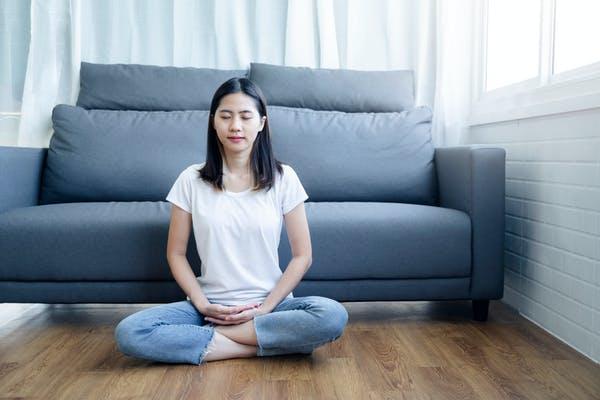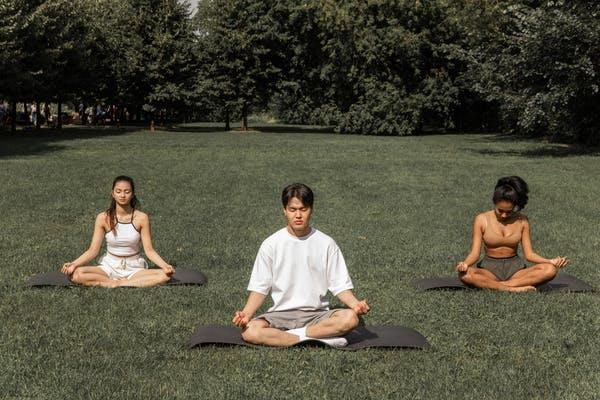
Aug. 31, 2021
Mindfulness meditation in brief daily doses can reduce negative mental health impact of COVID-19
The uncertainties, loss and isolation of the COVID-19 pandemic and its associated restrictions have disrupted many people’s emotional well-being. This has been exacerbated by the constantly evolving public health guidelines and news stories, which increase anxiety and fear in many people.
The urgency of this problem has led mental health professionals and scientists to call for the further development of mental health science and intervention during the pandemic. As vaccination rates increase, there is an opportunity to redirect public health efforts to manage the mental health consequences of the pandemic.
- Co-authors of this article with Julia Kam, Faculty of Arts and Cumming School of Medicine, Chelsie Miko Hart, Faculty of Arts, and Lianne Tomfohr-Madsen, Faculty of Arts, are: Caitlin Mills, University of New Hampshire and Jessica Andrews-Hanna, University of Arizona
As a team of cognitive neuroscientists and a clinical health psychologist studying mind wandering and ways to improve well-being in vulnerable populations, we responded to the call for action for mental health interventions. Specifically, we studied mindfulness meditation as a potential coping strategy for these mental health adversities.
Mindfulness meditation during COVID-19
Mindfulness refers to a mental state of focusing on the present moment, and accepting the current state of the mind and body without judgement. Mindfulness meditation is a mental practice that helps achieve that state of mind.

Researchers studied mindfulness meditation as a potential strategy for coping with the mental health effects of the pandemic.
Shutterstock
Ample research supports the use of mindfulness meditation for better mental health, but it was unclear whether these effects would hold true in the context of COVID-19 with prolonged quarantine and related stressors. In our study, we found that a regular dose of mindfulness practice every day for 10 days provide a buffer against the negative impact of COVID-19 news consumption.
Here’s what we did: we looked at whether 10 minutes of mindfulness meditation guided by a smartphone app could cushion some of the negative effects of COVID-19 on emotional well-being. We found that individuals who practised mindfulness daily for 10 days reported a happier mood (what researchers call “positive affect”) compared to those who did not.

Meditation can provide a buffer against the negative mental health impact of COVID-19-related news.
Shutterstock
Importantly, individuals who practised mindfulness were not as negatively affected by exposure to COVID-19-related news, suggesting that being more mindful served as a sort of buffer against stress.
Our study shows that a brief daily practice of mindfulness meditation not only enhances positive affect, but it also helps protect against the negative impact of COVID-19-related news exposure on emotional well-being. Our results convey two main messages:
- They inform us that guided mindfulness meditation holds promise as a simple-to-implement, cost-effective technique that can be practised anywhere, anytime.
- They prompt us to reconsider strategically planning when we consume news.
How to begin practising mindfulness
So you might be asking yourself, what can I do if I want to start practising mindfulness? A good place to start is to find a platform that provides instructions for beginners. There are a number of smartphone apps offering introductory meditation programs that are free or low cost.

Choose a mindfulness meditation program that suits your priorities.
Shutterstock
Choosing a program that matches your specific needs is also important. For example, in our study people could choose to practise one of four courses, focused on kindness, managing anxiety, letting go of stress or concentration. After choosing a program, find a time to practice regularly for a few weeks and see if you start to notice a difference in your day-to-day mood or how you respond to stress.
For new practitioners to mindfulness, there are a few things to keep in mind.
First, there can be a tendency for minds to become judgemental, especially when they begin learning a new skill like mindfulness. For example, you may judge yourself for not being able to focus consistently. Remember that mindfulness is about focusing on the here and now in a non-judgmental way. So learning not to judge yourself is a crucial part of the practice.
In other words, it is not simply about being able to focus on your breath but is instead about noticing what is happening in the present moment, and then choosing to respond in a way that lines up with your values. So, if you find that you lose focus on your breath 100 times during a meditation practice, and yet you try again, you are doing it exactly right!

Practising mindfulness as a group can be helpful.
Pexels/Monstera
Second, this has been a tough year full of unprecedented challenges. We have found for ourselves and our clients that practising self-compassion in addition to developing mindfulness can help to soften the blow of repeated stressors. Remember that whatever you are going through, if it is emotionally or physically painful, you deserve compassion for that experience.
Finally, humans are social creatures. Although we found that practising mindfulness on your own improved well-being, having group support can be really helpful to keep your practice going. So look into local resources for online or in-person options to practise meditation with other like-minded individuals.
Whether you practise mindfulness by yourself or in a group, in the morning or evening, daily or every few days, it’s most important you find an approach that works best for you.




